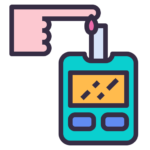Expertise

Diabetes medical devices Artificial pancreas
The development of algorithms related to the different elements involved in glycemic control loop for the artificial pancreas has been one of the main research lines over the last years. In it we have developed algorithms to monitor and calibrate the continuous glucose monitors and have designed control systems, with special focus to the rejection of major disturbances such as food or exercise. Developed semi-closed loop and closed loop algorithms have been validated in silico and in clinical trials in patients with type 1 diabetes.

Fault detection and risk assessment
Interval predictive models combined with other methodologies such as CBR, multivariate statistical control, data mining, etc. have been used to develop tools to detect faults on devices (occlusions, insulin pumps losses, loss of sensitivity of the sensors, etc.) within the framework of self-management of diabetes, both type 1 and type 2. For this we have developed a methodology for fitting models for a specific patient, taking into account various situations and conditions under which it can be found for example in situations of disease, premenstrual period, exercise, etc. Risk assessment methods have also been used to assess and to predict the risks that are taken to perform an action. These tools are currently under clinical evaluation.

Smart healthcare and m-health
Using information technology to provide personalized health services, improve user experience, increase the involvement of patients and move towards integrated health systems.
Development of apps to aid in decision making as components of telemedicine systems. Development of advanced telemedicine systems and tools for chronic disease management, particularly diabetes and hypertension. Incorporation of prevention and prediction tools in the current systems for managing diabetes.

AI-based DSS for diabetes
Decision support tools based on machine learning methods have become a viable way to enhance patient safety by anticipating adverse glycaemic events, despite the difficulties of the large intra-individual variability and other factors that affect glycaemic control.
The main problem of treatment safety in patients with intensive insulin therapy is severe hypoglycaemia. Strict control of blood glucose must be achieved to reduce the risk of microvascular and macrovascular complications in patients with type 1 diabetes.
